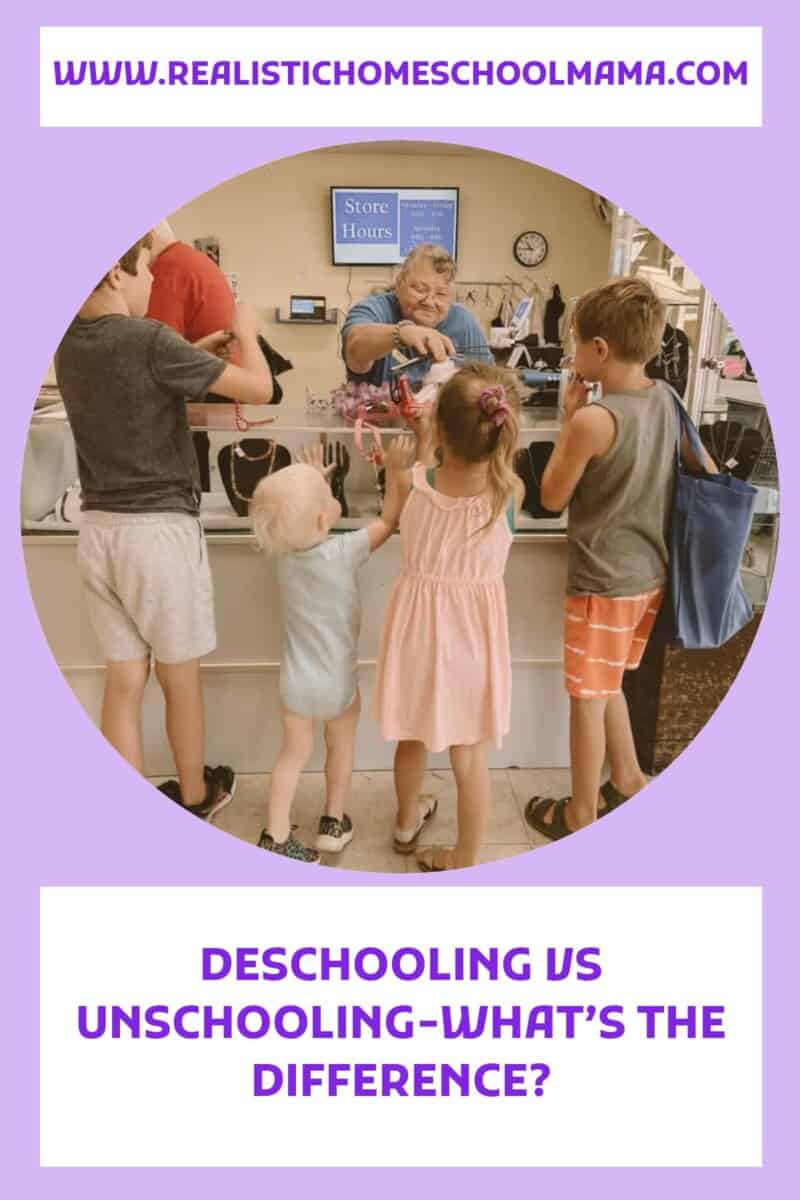If you’ve been hanging around the homeschool community for any time at all, you may have heard people talk about deschooling vs homeschooling and wondered what the difference is between the two. While the terms deschooling and unschooling both fall under the category of homeschooling, they have very different meanings.
Deschooling is a period of adjustment when switching from public school to homeschooling, whereas unschooling is a STYLE of homeschooling. While they may look similar on the surface, the intent behind the two is very different. Deschooling is a period of temporary transition, whereas unschooling is an ongoing lifestyle.
Let’s dig a little deeper into the differences between the two…
Is Deschooling the Same as Unschooling?
Deschooling and unschooling look very similar, but they are not the same thing. De-schooling is a temporary, transitional period of time. Unschooling is an educational philosophy and life style.
The purpose of deschooling is to “detox” from a previous schooling situation, whereas the purpose of unschooling is ongoing education.
When moving from a more formal schooling situation – if that be public school, private school, or even school at home – into a less formal schooling situation such as traditional homeschooling or unschooling, deschooling can be a very important part of that process.
Taking a period of time to “detox” from the school system allows you heal any damage emotional damage done while in school. It allows you time to let of previously held beliefs surrounding school and education. It gives both the child and the parent the opportunity to destress and un-learn what was learned in school, so that they can begin to learn naturally…through play, curiosity and experimentation.
What is Deschooling?
(First of all, if you still aren’t sure what deschooling is, first go read Deschooling: What Does it Mean, and Do You Need to Do It?, then come back here!)
Deschooling is usually the adjustment period a family goes through when leaving school and beginning the homeschooling journey. However, it can also be a transitional time when switching from a more traditional homeschool style into a less formal, “unschool” style of homeschooling.
Making the transition from traditional education to a less traditional education style can take time to navigate. Setting aside a period of time to “deschool” can help in that process by allowing a child’s stress levels to lower and their nervous system to reset. It also allows both the child and parents time to let go of old thought patterns and beliefs that may not longer be serving them.
Be sure to also check out my blog post Deschooling-Necessary Transition or Waste of Time, if you’d like to read a little more about why deschooling is so necessary in creating a smooth and peaceful transition into homeschooling.
What is Unschooling?
Unschooling is life without school. Unschooling means not only not sending your children to school, but not re-creating school at home, either. Unschooling rejects the concept of traditional schooling, and embraces life itself as the teacher.
Unschoolers don’t follow a set curriculum, and they don’t approach education as a one-size-fits-all linear process. Rather, they take a holistic learning approach, allowing a child’s knowledge to grow organically as they experience the world and develop.
Unschooling aims to allow children to lead the way in their education by following their interests and developing their skills and talents through exploration, experimentation and interaction in the real world.
Unschoolers recognize that each child is unique and learns on their own timeline. They trust that a child will learn what is needed when the desire and motivation arises, and when learning a particular thing becomes important to them.
Is Unschooling a Form of Homeschooling?
Unschooling is a form of homeschooling that involves exploring the world and learning organically through daily life.
While most homeschooling styles are more structured and traditional in nature, the term “homeschooling” is also used as an umbrella term under which many educational styles and philosophies – including unschooling- fall.
Examples of other types of schooling that fall under the homeschool umbrella include:
- Traditional Homeschooling
- Roadschooling
- Worldschooling
- Unschooling
- Eclectic Homeschooling
- Classical Homeschooling
- Montessori Homeschooling
- Unit Studies
- Charlotte Mason Homeschooling
- Waldorf Homeschooling
How Long Should Deschooling Last?
There is no set timeframe for how long the deschooling process should last. Each situation is unique. Generally speaking however, the longer your child has been in a formal school setting, the longer it may take them (and you!) to adjust.
A very loose guideline would be to plan on deschooling for at least one month for every year that your child was in school. For example, if your child was in school for two years, you would deschool for at least two months.
The great thing about deschooling is that it’s completely flexible! You can deschool for as long or as short of a time frame as you would like or is needed. Its completely up to you!
Just remember that everyone will have a different adjusting period, and that is ok. Some children will need more time to destress and decompress than others.
I wrote a more in depth blog post exploring how long it can potentially take to deschool, so be sure to go read that when you are done here.
In summary, the answer to how long deschooling should last is however long it needs to. Play by ear, enjoy the process and give your child (and yourself) permission to completely reset so that you can enter into your homeschooling adventure fresh, bright eyed and eager to learn!
What Does Deschooling Look Like?
Deschooling looks different for everyone, but it’s important to keep in mind that the focus of deschooling is more on doing nothing, and less on doing something. Use this important time to de-stress and rest.
Keep in mind that the age of your child(ren) will have a big impact on what the dechooling process will look like for you. Often teenagers will need more time to “unprogram” from school, and they may find the process more frustrating than a younger child. Initial moodiness and grumpiness is to be expected…remind yourself that this is a big change and they won’t stay sullen forever.
Your deschooling days might look a lot like what a typical weekend looks like…going with the flow and hanging out together as a family, doing simple activities like:
- playing in the yard
- going parks
- hiking or biking
- baking together
- watching a movie
- fixing dinner
- sleeping in
- doing chores
- playing board games
Don’t do any formal homework while you deschool. Instead, focus on building and strengthening your relationships with your kids.
Ask your kids children what they’d like to do and do that!
You get the idea…make it fun and embrace the journey! Don’t feel like you need to rush or control the process, and you may just come out on the other end with a fresh new perspective on life!
Recent Posts
The freedom to educate our own children in the whatever method we see best suited to their needs is a freedom I do not take lightly, and am eternally grateful for. SO much is available to us, and...
There are a LOT of things about the Charlotte Mason method of homeschooling that appeal to me. However, the theory of intentionally developing good habits in your children is one that I admittedly...



